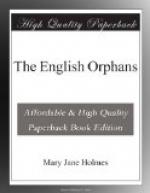CHAPTER I.
The emigrants.
“What makes you keep that big blue sun-bonnet drawn so closely over your face? are you afraid of having it seen?”
The person addressed was a pale, sickly-looking child about nine years of age, who, on the deck of the vessel Windermere, was gazing intently towards the distant shores of old England, which were fast receding from view. Near her a fine-looking boy of fourteen was standing, and trying in vain to gain a look at the features so securely shaded from view by the gingham bonnet.
At the sound of his voice the little girl started, and without turning her head, replied, “Nobody wants to see me, I am so ugly and disagreeable.”
“Ugly are you?” repeated the boy, and at the same time lifting her up and forcibly holding her hands, he succeeded in looking her fully in the face, “Well, you are not very handsome, that’s a fact,” said he, after satisfying his curiosity, “but I wouldn’t be sullen about it. Ugly people are always smart, and perhaps you are. Any way, I like little girls, so just let me sit here and get acquainted.”
Mary Howard, the child thus introduced to our readers, was certainly not very handsome. Her features, though tolerably regular, were small and thin, her complexion sallow, and her eyes, though bright and expressive, seemed too large for her face. She had naturally a fine set of teeth, but their beauty was impaired by two larger ones, which, on each side of her mouth, grew directly over the others, giving to the lower portion of her face a peculiar and rather disagreeable expression. She had frequently been told that she was homely, and often when alone had wept, and wondered why she, too, was not handsome like her sister Ella, on whose cheek the softest rose was blooming, while her rich brown hair fell in wavy masses about her white neck and shoulders. But if Ella was more beautiful than Mary, there was far less in her character to admire. She knew that she was pretty, and this made her proud and selfish, expecting attention from all, and growing sullen and angry if it was withheld.
Mrs. Howard, the mother of these children, had incurred the displeasure of her father, a wealthy Englishman, by marrying her music teacher, whose dark eyes had played the mischief with her heart, while his fingers played its accompaniment on the guitar. Humbly at her father’s feet she had knelt and sued for pardon, but the old man was inexorable, and turned her from his house, cursing the fate which had now deprived him, as it were, of his only remaining daughter. Late in life he had married a youthful widow who after the lapse of a few years died, leaving three little girls, Sarah, Ella, and Jane, two of them his own, and one a step-daughter and a child of his wife’s first marriage.




